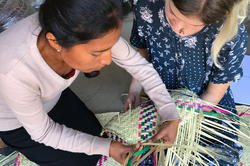RISD Global offers two virtual summer studios focused on the cultures and design traditions of Denmark and Italy.
RISD Global Flies Again

How can living and studying in an unfamiliar culture help to spur new ideas and strengthen creative agency? Dozens of RISD students are finding out the fun way this summer while bonding with fellow artists and designers participating in RISD Global’s immersive, three-week travel courses in Europe.
“We were very excited when the travel restrictions were lifted and we were able to offer in-person classes again,” says RISD Global Program Advisor Catherine Best. “We’ve got six classes going—in Denmark, Paris, Italy and the Azores (off Portugal)—and we’re tapping the expertise of longtime RISD faculty members who know these communities well.”

Two of the classes are taking place concurrently in Paris, “the city of lights,” where students are experiencing world-renowned landmarks like the Louvre first-hand and also taking the time to roam the neighborhoods and chat with locals. “Paris prioritizes the quality of its public realm,” says instructor Andrew Hartness. “The course I’m teaching, Scripting Spaces in Paris, considers the city a foundational point of departure for cinematic culture and an environment whose cultural, narrative and architectural characteristics prompt storytelling.”
“The course I’m teaching... considers Paris a foundational point of departure for cinematic culture.”
Students are familiarizing themselves with the streets of Paris and then scripting short films to be shot in the spaces of their choosing. The goal is not only to learn how to make a movie but also to hone the skills needed for setting up sequences and spaces in other design disciplines.

Across town, a class led by faculty member Pascale Rihouet is studying the selling, buying and exhibiting of art. “The goal is for artists and designers at RISD to understand the aftermath of art making—something that they will eventually engage with once they become professionals,” says Rihouet. Students are touring public and private locations that display art and visiting with dealers, gallerists, curators, auctioneers and scholars. Among other topics, they’re investigating how art is priced and what role ethics play in exhibiting work collected during the Colonial era.
“Students will draw various streetscapes, landscapes and sites of antiquity through the eyes of Piranesi, using the techniques he used, like vanishing point perspective.”
Two summer classes are also underway in Italy: Endemic & Endogenous Design Explorations in the Cinque Terre region near the Mediterranean Sea and Perspectives on Piranesi, a drawing class exploring the legacy of 18th-century engraver Giovanni Battista Piranesi, in Rome. “Piranesi was also a skilled architect, surveyor, curator, antiquarian and archaeologist,” says instructor Nick De Pace. “Students will draw various streetscapes, landscapes and sites of antiquity through the eyes of Piranesi, using the techniques he used, like vanishing point perspective.”


The other class in Italy, led by native son Professor Paolo Cardini, is intended to expose students to sustainable design practices, using local resources and creating products within a specific culture or tradition. “Through notions of circular economy and material innovation, students will develop endogenous (human-related) product ideas that will adopt local resources and processes to serve specific endemic needs,” Cardini explains.

Husband-and-wife team Jonathan Knowles BArch 84 and Laura Briggs BArch 82 are also focused on design in their class set in the volcanic archipelago of the Azores. “Island nations are at the forefront of climate change and thus have the potential to act as incubators in green-designed futures,” the RISD Architecture faculty members explain. Students are observing the environment and then working together to create a butterfly and bee pavilion that will be installed in the garden of the Quinta do Priôlo, an organic farm and community space in Ponta Delgada.
“Island nations are at the forefront of climate change and thus have the potential to act as incubators in green-designed futures.”
And way up north in Copenhagen, Denmark, longtime RISD faculty member Nathaniel Smith is leading a class focused on Scandinavian design and examining historical and social changes in Denmark and their effects on Danish Modern and contemporary Danish design. “We’re focusing on furniture but also exploring its relationship to architecture, graphic arts, lighting and textiles,” Smith says.


All of the students participating in summer travel courses keep visual journals of their adventures and design projects, which should provide inspiration for years to come.
—Simone Solondz
Learn more about RISD’s international travel programs at global.risd.edu.
July 26, 2022

